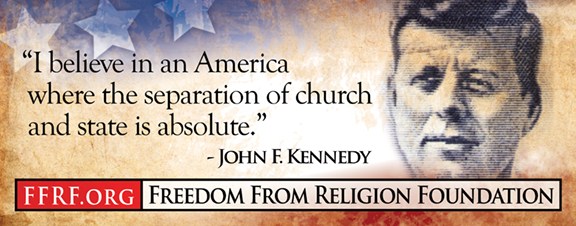
The Freedom From Religion Foundation will be attempting to convince a Colorado civil rights committee this evening that the state constitutional “No Aid” clause should be preserved and enforced.
FFRF Director of Strategic Response Andrew Seidel will be testifying at the University of Denver tonight, Tuesday, July 18, at around 6 p.m. before the Colorado Advisory Committee to the U.S. Commission on Civil Rights on the importance of preserving the state’s “No Aid” clause, commonly referred to as the Blaine Amendment.
In 1875, Congressman James Blaine proposed an amendment to the U.S. Constitution. Although this amendment failed to pass the U.S. Congress, 38 states including Colorado, adopted some form of the Blaine Amendment in their constitutions. In June 2015, the Colorado Supreme Court ruled that a county scholarship program that aided religious schools would violate the state’s Blaine Amendment (also known as the “No Aid” Clause), which bars “public moneys” from being allocated “in aid of any church or sectarian society.”
The no-funding principle has a long, clear history that shows it was designed to foster religious freedom, FFRF asserts.
“The principle in every No Aid Clause, including Colorado’s, is that the government should not tax citizens to benefit a religion,” Seidel states in his testimony. “Religious education, propagation and worship should be the result of free and voluntary support given by the faithful.”
The principle underlying No Aid Clauses dates to America’s founding and was uniformly accepted after years of experience. This history seems distant today, but was the result of centuries — millennia—of oppression by religion blended with government. Thanks to the separation of state and church, we do not have that oppressive experience.
Even now, some use the machinery of the government to impose their religion on others, FFRF points out.
“The nonprofit I represent, the Freedom From Religion Foundation, exists because people disregard clear constitutional rules all the time,” Seidel says. “We get about 5,000 state church complaints every year from all over the country. In the past five years, we’ve received more than 300 complaints from Colorado, addressing nearly 100 different violations. I have a job because in our democratic republic, individuals occupying government offices and employed by the government often use their public power to promote their personal religion.”
The push to eviscerate No Aid Clauses is meant to augment the benefit churches receive under the separation of state and church and minimize the burdens. Vouchers and school choice provide a perfect example.
Last month, the Supreme Court decided Trinity Lutheran v. Comer, holding that the state could not bar a school, even a religious school, from a state program that resurfaced playgrounds.
The Trinity Lutheran decision did not analyze or address any federal Establishment Clause concerns, nor did it declare Missouri’s No Aid provision unconstitutional. So, the impact of this ruling on Colorado’s No Aid clause is minimal.
In the minds of some school choice activists, the rise of nonreligion and the erosion of traditional Protestantism in this country is due to public schools, FFRF underscores. School choice is theoretically about privatizing education, but for many it’s about ending public education.
“And that is what will happen if We the People abandon the no-funding principle and No Aid Clauses,” Seidel concludes. “Not only will citizens be taxed to support religions in violation of their rights of conscience, and not only will this call down extensive state regulation of religious operations, it will also destroy our public schools.”
This is a scenario that will indeed spell doom for our country, Seidel will testify.

